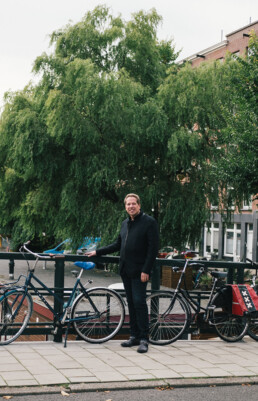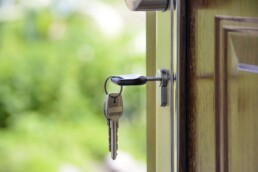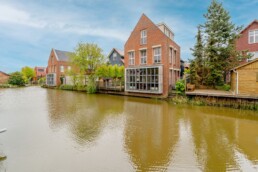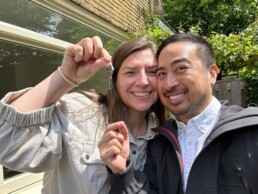Buying a Home in 2025: Key Changes Every Buyer Should Know
Today marks the first workday after a refreshing two-week vacation. With over 23 years of experience as a certified purchase agent, I’ve guided expats and locals through the housing market. Here’s what’s new for homebuyers in 2025.
Higher NHG Limit
The NHG limit is now €450,000, offering more security to buyers in higher price ranges. Make sure the purchase price matches the property value, as NHG covers only up to 100% of the appraised value.
Stricter Sustainability Standards
Sustainability remains a big focus in 2025. Homes with high energy ratings are in demand because of lower energy costs and environmental benefits. Sellers who invest in solar panels or insulation can attract more buyers and sell at better prices. It’s a win-win for both sides.
Abolition of the Jubelton
The "jubelton," which allowed parents to gift up to €106,671 tax-free for home purchases, is no longer available. From 2025, tax-free donations for housing are no longer allowed. This change especially affects young buyers who rely on help from their parents.
Changes in Transfer Tax
If you buy a home as your primary residence, you benefit from the lower transfer tax rate. First-time buyers under 35 still benefit from 0% transfer tax for homes up to €525,000. However, if you buy a second home as an investment property, you will pay a higher transfer tax rate of 10.4% of the purchase price. This rule has been in place since 2021 and continues to be a key factor for investors.
Reduced Mortgage Interest Deduction
In 2025, you can claim 35.82% or 37.48% of the mortgage interest you pay as a tax refund. The exact percentage depends on your income and the interest amount. Retirees eligible for AOW can get a refund rate of 17.92% or 37.48%, depending on their financial situation.
Eigenwoningforfait
The eigenwoningforfait rates for 2025 remain unchanged. For homes with a WOZ value up to €1.33 million, the rate is 0.35%. For homes above €1.33 million, it’s 2.35%.
If you own a home, a notional amount is added to your income because your home is considered a source of income. This is called the eigenwoningforfait and is a percentage of your home’s WOZ value.
More Mortgage Space for Singles
Single buyers can now borrow more for a mortgage compared to dual earners with the same income. In 2025, singles can borrow up to €17,000 extra. This allows a single person earning €40,000 to qualify for a higher mortgage than two people earning the same amount together.
A Stabilizing Market
Bidding wars are less frequent, but demand remains high in cities like Amsterdam. A clear strategy is key to securing the right home.
Final Thoughts
According to De Nederlandsche Bank (DNB), housing prices will likely keep rising in 2025. The central bank predicts an average of over €500,000 will be needed for a new home.
In today’s market, working with a certified agent is more important than ever. As an experienced agent, I know the market and have strong connections. If a sale fails and the home comes back on the market, I often hear about it first. Agents prefer working with other agents, which gives you an advantage.
People sometimes overbid without preparing their finances. Remember, mortgages only cover 100% of the property value, which may not match the price you pay. If there’s a gap, you’ll need to cover it with your own funds, in addition to regular buyer costs.
By teaming up with a certified agent, you can navigate these challenges with confidence and ease. With my A-to-Z service, I ensure the process is smooth and secure. My 23 years of experience help you make smart decisions and face any challenges with confidence. If you’re looking to buy in Amsterdam, Amstelveen, or nearby, let's connect and send me an email via info@burgemeestervastgoed.nl
How to Beat Overbidding in Amsterdam’s Market: Why Some Buyers Can’t Win and the Role of Agent Fees
Buying a home in Amsterdam isn’t easy. With only 30% of properties owned by individuals, the market is tight. High demand and low supply put pressure on every buyer, especially with rising prices and constant bidding wars.
Overbidding: Cash is King
Imagine finding the perfect home—only to discover ten other buyers feel the same way. Overbidding is common here, and those with cash or the willingness to bid high often come out on top. But there’s a catch. In the Netherlands, banks only finance up to 100% of a property’s actual value, not the purchase price. If a home is valued at €475,000 and the winning bid is €525,000, buyers must cover the €50,000 difference themselves, along with 2-6% in transaction costs.
Imagine finding the perfect home—only to discover ten other buyers feel the same way. Overbidding is common here, and those with cash or the willingness to bid high often come out on top. But there’s a catch. In the Netherlands, banks only finance up to 100% of a property’s actual value, not the purchase price. If a home is valued at €475,000 and the winning bid is €525,000, buyers must cover the €50,000 difference themselves, along with 2-6% in transaction costs.
The Ups and Downs of Bidding
Losing a bid is part of the process here, and it can feel discouraging. But persistence pays off. My advice? Take a deep breath, let off some steam, and get back in the game. With the right approach and a resilient mindset, your time will come.
Why Having an Agent Matters
A strong buyer isn’t just financially ready—they’re reliable. Agents prefer working with other agents because it saves time and keeps the process smooth. Buyers without an agent often need more guidance, which slows things down. And since selling agents are paid by their clients, extra time spent on buyers without representation is unpaid.
When a deal falls through, sellers typically turn to past bidders with solid offers before returning to market. Here’s where having an agent with a strong network really makes a difference. I help position you as a serious, well-prepared buyer, which can increase your chances of getting a call back.
The Key to Success: Trust Your Agent
Teaming up with an experienced agent is a big advantage. I’ll guide you through Amsterdam’s complex market, present you as a reliable buyer, and keep the process moving smoothly. With the right agent and a realistic approach, you’ll be well-positioned to find a home that matches your goals and budget.
Why Paying a Percentage Fee Aligns Our Interests with Yours
There are rumours in the market that some selling agents charge an extra fee above the fixed fee if the sale price exceeds a certain amount. While this can be very lucrative for them, as a buyer, it’s a tricky situation. With over 20 years of experience as a certified purchase agent in Amsterdam, one of my key roles is to keep you grounded throughout the process.
If a property is underpriced, I’ll know and I’ll advise you accordingly. If we don’t win the bid, it’s disappointing, but my job is to help you stay realistic and focused. Just like with overbidding, sometimes walking away is the best option.
We offer a full-service package with a no-cure, no-pay policy. We only get paid if we deliver a successful deal. Our fee is 1.5% of the purchase price, excluding 21% VAT, and is based on the work we do. We would be out of business very soon if we advised you to bid much higher just to increase our fee. To put it simply: for every €10,000 increase in price, we make only €150 extra. Hardly enough to get excited about, right? It’s certainly not worth inflating the price.
I’ve built my reputation over two decades by being transparent, working hard to get the best deal for you, and always keeping your best interests at heart. I prefer to rely on your referrals, which are the true measure of my success.
Let’s work together to find you the perfect home, without the added pressure of inflated fees or unrealistic expectations. E-mail me at info@burgemeestervastgoed.nl, and let’s get started today!
Barry Burgemeester: Real Talk on the Amsterdam Housing Crisis
Barry Burgemeester is a seasoned purchase agent in the Amsterdam and Amstelveen market. With over 20 years of experience, he focuses on helping clients buy homes. He offers a complete A-Z service, working on a no cure no pay basis. Barry never takes on competing clients, ensuring he is dedicated to each buyer.
The Overheated Market
Today, the housing market is overheated. This situation arises from a simple fact: only about 30% of people in Amsterdam own their homes. This means that demand is very high while available homes are very low. Everyone is looking for the same properties.
Barry often says, "If you don’t work in real estate every day, it’s hard to see what’s really happening." Recently, Maxim Bours, director of Huispedia, commented on the issue. He noted an increase in overbidding, stating that homes are often listed at too low a price. Bours claims, “A low asking price attracts more buyers and leads to bidding wars.”
However, Barry believes this view is too simplistic. The problem isn't just low prices. It’s about fair pricing that leads to bidding wars due to desperation. The reality is that there is simply not enough supply. Blaming real estate agents for this situation is unfair. Many agents, feel overwhelmed by the demand.
Recent Tax Changes
New Box 3 tax rules have also impacted the market. Starting in 2023, people renting out properties will face higher taxes. A larger percentage of the WOZ value, known as the empty value ratio, is now used to assess wealth. If a rental property has a mortgage, the situation worsens because the mortgage cannot be deducted from the WOZ value. Additionally, the Tax Authority applies a higher hypothetical yield percentage of 6.17% to this wealth. This change has led some owners to sell their properties instead of renting them. But even with these new listings, the market still suffers from a shortage.
Who Is to Blame?
So, who is responsible for this situation? Is it the real estate agents? Barry thinks it's not fair to blame agents alone. After all, many agents are also overwhelmed by the market's demands. Furthermore, Barry highlights that some claims about the bidding process are misleading.
In reality, bidding on a house does not follow a perfect process. For instance, the so-called ‘low in the market’ strategy can lead to crowded viewings. However, Barry insists it’s not common practice for buyers to be asked to submit higher bids after their initial offers. Instead, there is a closed bidding system where buyers submit their best offers, and then the seller chooses which offer to accept. If, by chance, a better offer comes in after the closing date, the seller's agent must present it to the seller.
Barry also remembers when negotiations were simpler. "In the early days, we had a fair negotiation process," he says. During that time, buyers could adjust their offers and negotiate in real-time. While today’s system has its benefits, it often creates tension between agents who strictly follow closed bidding and those who prioritize their clients' best interests.
The Role of the Press and Future Predictions
As long as the press continues to share non-objective articles, it is hard to understand the housing shortage fully. Barry believes that blaming bidding wars solely on agents is misguided. Politicians should listen to the community and work towards effective solutions, built more homes for instance. "There is a tunnel vision surrounding this issue that needs to be acknowledged," Barry asserts. He predicts that the housing shortage will last for a long time and emphasizes that collaboration is essential for real change.
As Barry continues to navigate this complex market, his focus remains clear: to provide exceptional service and help clients achieve their homeownership goals in a challenging environment. "Our first meetings are all about expectatations and how to handle the dissapointment if it does not work out at first. We think there is a house for everyone, sometimes it just takes a long breath and some time".
Top Tips for Homebuyers
- Get Your Numbers Straight: Understand your budget and mortgage options so you can act quickly when the right property appears.
- Follow Advice: Seek guidance from experienced professionals, including real estate agents and financial advisors. Their insights can be invaluable.
- Be Realistic: Set achievable goals based on the current market. Understand that the perfect home may require some compromises.
- Know When to Walk Away: Sometimes, it’s better to walk away from a deal that doesn’t meet your needs or feels rushed. Trust your instincts and don’t settle.
You can reach barry via info@burgemeestervastgoed.nl and plan a free initial meeting.
photocredits: freepic
Increased NHG Limit for 2025: Opening Doors to Homeownership
The National Mortgage Guarantee (NHG) Limit for 2025 is Set
The National Mortgage Guarantee (NHG) limit for 2025 has been set at € 450,000. For mortgages that include additional energy-saving features, this limit will be 6% higher, reaching € 477,000. Additionally, the one-time premium for obtaining a mortgage with NHG will decrease to 0.4%. These changes will enable more homebuyers to secure a mortgage with NHG.
The NHG limit is recalibrated annually using an established method that takes into account the development of housing prices.
Reduction in NHG Premium
The reduction of the closing premium from 0.6% in 2024 to 0.4% in 2025 is particularly beneficial for first-time buyers and those with mid-range incomes. For a mortgage of €450,000, buyers will pay € 1,800 in premiums starting next year instead of € 2,700, resulting in a gross savings of € 900.
Affordability Limit Set
The government aims to produce 100,000 homes annually, with two-thirds designated as affordable. The limit for affordable purchase homes will be indexed according to the Consumer Price Index (CPI) again this year. For 2025, the upper limit for affordable purchases will be €405,000, compared to €390,000 in 2024.
Enhanced Protection
The NHG provides homebuyers with access to responsible mortgages when purchasing a home. With an NHG mortgage, buyers face fewer risks and often benefit from lower interest rates. The NHG also serves as a safety net for households experiencing personal circumstances such as relationship breakdowns or disability. This safety net allows buyers to make more informed and confident decisions when purchasing a home, knowing they have additional support during challenging times.
While I appreciate these developments, the housing market remains largely locked for individuals without savings or parents who can offer a family loan. I celebrate every opportunity created to help young people find their own place. My name is Barry Burgemeester and my goal is to be a supportive agent for everyone, so if you have any questions or need assistance, please feel free to reach out via email: info@burgemeestervastgoed.nl
5 Onmisbare Tips voor het Succesvol Kopen van een Huis in Amsterdam
Wij kopen al meer dan 20 jaar huizen aan voor expats in Amsterdam en omstreken. Toch weten ook steeds meer Nederlandse klanten ons te vinden. Speciaal voor hen heb ik dit stukje in het Nederlands geschreven: 5 onmisbare tips voor iedereen die in de Amsterdamse regio een huis wil kopen.
Tip 1: Begin met sparen voordat je denkt aan een huis kopen
Voordat je een woning gaat kopen, is het belangrijk om een goed financieel plan te hebben. Voor de aankoop van een huis heb je al snel 2-6% van de koopsom nodig voor kosten koper (zoals notaris- en makelaarskosten). Dit is nog exclusief mogelijke overbiedingen en het eventuele verschil tussen de koopprijs en de taxatiewaarde van de woning. Ben je jonger dan 35 jaar en koop je een huis onder €510.000? Dan kom je in aanmerking voor een eenmalige vrijstelling van de overdrachtsbelasting. In andere gevallen moet je rekening houden met een kostenpost van 4-6% van de aankoopprijs.
Tip 2: Raadpleeg een hypotheekadviseur voordat je begint met zoeken
De huizenmarkt in Amsterdam is erg snel. Daarom is het cruciaal om te weten wat je kunt lenen, zodat je snel kunt handelen wanneer je jouw droomhuis vindt. Een hypotheekadviseur kan je hierbij helpen. Zorg ervoor dat je eerlijk bent over je financiële situatie, inclusief eventuele spaargelden of leningen, zodat je weet wat jouw mogelijkheden zijn.
Tip 3: Kies voor een lokale en gediplomeerde aankoopmakelaar in Amsterdam
In Amsterdam kom je regelmatig uitdagingen tegen zoals erfpacht, Vereniging van Eigenaren (VvE), funderingsproblemen en regelgeving rondom verbouwingen. Daarom is het belangrijk om een ervaren en gecertificeerde aankoopmakelaar in de arm te nemen die de markt door en door kent. Het beroep “makelaar” is niet beschermd, dus kies bewust voor iemand met kennis van de Amsterdamse huizenmarkt. Een professionele makelaar zorgt voor begeleiding bij de bezichtigingen, onderhandelingen, en kan doorslaggevend zijn bij het sluiten van een deal.
Tip 4: Laat je niet ontmoedigen door teleurstellingen
Het kan gebeuren dat je meerdere biedingen verliest. De verschillen tussen de vraagprijs en de uiteindelijke koopprijs kunnen soms enorm zijn, en er zijn altijd mensen die meer kunnen bieden. Zorg ervoor dat je een realistisch beeld hebt van wat je kunt uitgeven en dat je weet wat de marktwaarde is van een woning. Een goede aankoopmakelaar helpt je bij het maken van strategische biedingen en voorkomt dat je onnodige fouten maakt.
Tip 5: Betaal nooit vooraf aan een makelaar in Amsterdam
In Amsterdam is het niet gebruikelijk om vooraf een makelaar te betalen. Alle betalingen, inclusief de courtage voor de aankoopmakelaar, worden veilig en transparant geregeld via de notaris. De notaris is een onafhankelijke partij die zorgt dat alle financiële transacties bij de aankoop van een woning correct verlopen. Dit geeft jou als koper de zekerheid dat alles volgens de regels gebeurt en er geen onnodige risico’s zijn. Betaal daarom nooit vooraf aan een makelaar of andere betrokken partijen; dit is simpelweg niet de standaard werkwijze in de Amsterdamse huizenmarkt.
Met deze tips ben je beter voorbereid op de huizenjacht in Amsterdam. Succes met het vinden van jouw droomhuis!
Ik ben Barry Burgemeester, 23 jaar gediplomeerd makelaar. Mijn missie is om huizenkopers goed te informeren en succesvol een huis te laten kopen.
Understanding the Woningwaarderingsstelsel
As purchase agents, we often help clients who want to buy a home as an investment to rent out. To explain the "Woningwaarderingsstelsel" (Housing Valuation System), here's what you need to know.
The Woningwaarderingsstelsel is a point-based system used to set the maximum rent for a property. It seemed like a good idea but can lead to issues. The system gives points based on the size of the home, number of outlets, and energy label. A property needs 187 points or more to qualify for the free rental market. For example, a studio under 50 m² with an A++ energy label might rent for €1,800, while a 75 m² apartment with an E label might be limited to €1,000 per month.
For many homeowners, the rent they can charge doesn’t cover their mortgage, taxes, and service costs. As a result, many decide to sell instead of rent, which reduces the number of homes available for rent.
Renters are feeling the impact. Rental prices keep rising, and no one is benefiting. As rents go up and homes are sold, more people stay with their parents longer or remain in small apartments. This makes it harder to move in with a partner or start a family.
Buying a home also comes with challenges. You need savings to cover extra costs like taxes and notary fees. More homes are coming onto the market, but the shortage is still so big that overbidding has become common—sometimes making us raise an eyebrow.
If you’re thinking about buying, make sure to budget for all the costs, stay realistic, and work with a local agent. It might be the best plan for the long run.
Why It’s Important to Attend Property Viewings in Person
Why Attending Property Viewings in Person is Important
Your real estate agent can attend a viewing and show you the property through a video call, but it’s not the same as seeing the home in person. Your agent can offer an objective opinion, but this will be **your home**. Only you can get the true feel of the space by being there.
Limited Viewing Dates
Most sellers and their agents set 2 or 3 dates for viewings. It’s important to make sure you or your partner attend at least one of them. If you miss it, there is no guarantee of a second viewing. Demand is high, so don’t count on having another chance.
High Demand Means You Need to Be Present
With today’s shortage of supply and high demand, sellers can choose from many buyers. Sellers prefer buyers who have attended the viewing in person. If you don’t, it might hurt your chances of securing the property.
Make Your Home Search a Priority
If you’re away or planning a holiday, let your agent know. It’s best to start your home search when you can commit to attending viewings in person. We understand that everyone is busy, but being a bit flexible with your schedule can make a big difference in finding your dream home.
Ready to Get Started?
I’m Barry Burgemeester a Certified Real Estate Agent serving Amsterdam, Amstelveen, Aalsmeer, Uithoorn, and the surrounding areas. With over 20 years of experience helping expats, I’m here to guide you through the process and help you find the perfect home.
Finding Your Ideal Family Home Near Amsterdam
For families looking to settle near Amsterdam, Aalsmeer, Amstelveen, Diemen, and Uithoorn offer a perfect mix of comfort and convenience. These towns provide suburban peace with easy city access, offering a range of housing options, from spacious apartments to single-family homes. The housing market is more relaxed than in Amsterdam, though still competitive.
Aalsmeer
Close to Amsterdam and Schiphol, Aalsmeer offers modern homes, including villas. With 14,199 households, 36% are families with children. Aalsmeer leads in sustainable construction, with large developments upcoming. Average list price: €583,722.
Amstelveen
Amstelveen is popular with families and expats, offering diverse housing near the city and Schiphol. With 45,149 households, 36% live alone. Over 50% of homes are single-family, and 47% are privately owned. Average list price: €660,222.
Diemen
Diemen combines urban proximity with township tranquility. With 16,669 households, 41% live alone. Developments like Holland Park attract families and professionals. Average list price: €524,818.
Ouderkerk aan de Amstel
Ouderkerk offers a peaceful setting with 6,466 households. Most homes are single-family, with 55% privately owned. Average list price: €666,756.
Uithoorn
Uithoorn’s green neighborhoods are ideal for families. With 13,747 households, 33% are families with children. The new Uithoornlijn tram connects to Amsterdam South. Average list price: €501,065.
ABOUT US
We operate as a purchase agent in Aalsmeer, Amstelveen, Diemen, Uithoorn, and the surrounding areas. Our team is dedicated to helping you find the perfect home. We're always happy to set up a Google Meet or an in-person appointment at our office to discuss your needs and guide you through the buying process.
Whether you're just starting your search or ready to make a move, we're here to assist you every step of the way.
Cold Figures vs. Reality: Home Buying Tips for 2024
In June 2024, the housing market experienced a significant shift. Prices of existing homes surged by 9.7% compared to the previous year, marking the biggest increase in two years, according to CBS Statistics. Despite this, the total number of transactions from June to June dropped by 12%, with only 14,662 homes sold. In the first half of 2024, 92,383 homes changed hands, with the average transaction price reaching €441,112.
Utrecht was the standout performer with a 17.3% price increase in the second quarter. Amsterdam followed closely with a 10.4% rise. The Hague saw prices climb by 5.9%, while Rotterdam experienced a 5.3% increase.
In Amsterdam, buyers typically pay 4.9% above the asking price. However, this figure can vary per home, so evaluating each situation individually is essential. All these statistics provide a clear picture of the 2024 market trends, but what if you're looking to buy a home? Our first expert tip is: stay positive!
Approach the Market with just 3 Home Buying Tips
Given these statistics, how can you navigate the home-buying process and stay realistic? Here are some home buying tips:
1. Understand your financial boundaries before diving into the market. Determine how much you can afford. This ensures you're ready to act quickly when you find the right home. A good financial advisor can provide invaluable guidance. They can help you understand your budget, explore financing options, and ensure you're financially prepared.
2. The demand often exceeds the supply in the housing market. Set realistic goals about what you can achieve within your budget. Understand that conditions can vary greatly depending on the location and specific property. We believe there is a house for everyone, so do not get too disappointed if you lose a bid, the home is not meant to be yours.
3. Work with a certified real estate agent who has an excellent reputation and proper qualifications. Since real estate is not a protected profession, ensure your agent is knowledgeable about local issues, especially in Amsterdam. They should understand topics like ground leases (which can affect your mortgage), moisture problems, owner associations, and foundation issues.
By keeping these points in mind, you can approach the home-buying process with confidence and clarity. Remember, preparation is key. Knowing your financial limits, seeking professional advice, and setting realistic expectations will help you navigate the market effectively.
---
My name is Barry Burgemeester, founder of Burgemeester Vastgoed, and a certified real estate agent. I have been helping expats buy their homes since 2001. If you would like to benefit from my expertise, feel free to email me at info@burgemeestervastgoed.nl
Mark and Cristina’s Journey: From Expats to Dutch Locals
From Expats to Nederlanders
In the world of real estate, it's not just about buying and selling houses. It's about building relationships and watching our clients' stories unfold. Mark and Cristina are a perfect example. We've helped them find their home three times, and their journey is a wonderful story of becoming part of the Dutch community.
Mark and Cristina started their journey in 2016 with their first home, a double upstairs place in Amsterdam West. As their family grew, they needed more space. In 2019, they moved to a bigger house, still in Amsterdam West. Just last week, they found their dream family home in Amstelveen.
We've seen Mark and Cristina grow, not just in their homes but in their lives too. They now have two beautiful children. We’re so proud they chose us to help them each step of the way.
The Changing Role of Expats
An "expat" is a person who lives outside their home country, often for work, usually planning to go back someday. But in the Netherlands, many expats have decided to stay. They build their lives here, make friends, and their kids grow up with Dutch kids in local schools. Some even become Dutch citizens, loving the relaxed lifestyle and good work-life balance.
The expat community is now a big part of Dutch society. Many expats feel so at home here that calling them expats doesn’t fit anymore. They are Nederlanders, fully part of the Dutch culture and economy.
Celebrating Mark and Cristina’s Story
Mark and Cristina’s story shows this change. From expats to being part of the local community, their journey is one of growth and new beginnings. Stories like theirs show that living in the Netherlands makes it special – a place where people from around the world can find a home and become part of the community.
As real estate agents, we love being part of these stories. We’re excited to help more families like Mark and Cristina find their perfect home and become part of the Dutch way of life. Contact us via info@burgemeestervastgoed.nl or fill in the contact form and we will get back to you ASAP!











